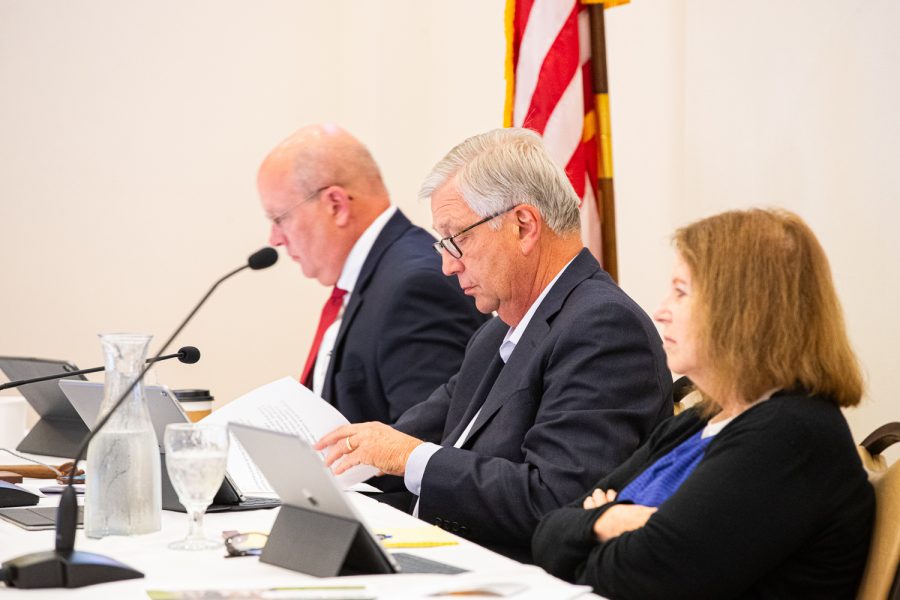UI faculty catastrophic-leave policy up for regents’ consideration
Following a unanimous vote by the University of Iowa Faculty Senate to move forward with a more inclusive catastrophic-leave policy, the state Board of Regents will consider approval of the revised policy at its meeting Nov. 14.
Iowa Board of Regents President Michael Richards sits alongside President Pro Tem Patty Cownie during a meeting at the Iowa State Alumni Center in Ames, Iowa, on Thursday, June 6, 2019. The Regents voted in favor of a four percent tuition increase starting in the fall semester of 2019.
November 5, 2019
The state Board of Regents will consider approval of proposed revisions to its universities’ current catastrophic-leave policy, which would allow nonvacation-accruing faculty and staff to receive catastrophic leave donations, effective Jan. 1, 2020.
Faculty and staff who accrue vacation at regent institutions are allowed to donate leave to eligible employees as sick leave during catastrophic illness or injury under the existing policy, according to regents’ documents. Nonvacation-accruing employees are not eligible for catastrophic leave donations, the documents read.
Iowa’s public universities are requesting that the regents expand eligibility for catastrophic-leave donations in its policy manual to include all faculty and staff members who hold a regular appointment that is 50 percent or greater and receive either vacation or sick-leave benefits. The regents will consider this policy at their Nov. 14 meeting.
According to regents’ documents, a catastrophic illness or injury is defined as a resultant medical condition for which a health-care provider has certified is likely to result in a loss of 30 or more work days.
RELATED: Fixed-term faculty protest catastrophic-leave policy outside UI Faculty Senate meeting
The proposed revisions include a list of circumstances when catastrophic leave would become an option for faculty and staff at regent institutions, including whether or not the eligible employee has yet to satisfy the waiting period for long-term disability benefits or is in maternity or medical recovery.
The updated policy will require that eligible employees can receive contributed sick leave only if they have exhausted all other sick or vacation leave they are otherwise entitled to and are not already receiving supplemental payments for long-term disability.
“An Eligible Employee shall not receive contributions for Catastrophic Illness or Injury in excess of the amounts necessary to cover the amount of leave permitted under this policy for the Catastrophic Illness or Injury,” the proposed policy change reads.
The University of Iowa Faculty Senate unanimously passed the proposed changes to catastrophic-leave policy in September. Faculty members began the initiative to make catastrophic-leave policy more inclusive last academic year, because the UI lacks a sick-leave bank — requiring individuals to request and receive donations directly.
RELATED: UI Faculty Senate expands catastrophic leave donation policy to include more faculty members
Faculty Forward protested the current catastrophic-leave policy and advocated for a sick-leave bank outside the Oct. 29 Faculty Senate meeting.
Faculty Senate President Sandy Daack-Hirsch said at the group’s October meeting that the new policy, if approved, will widen the scope of eligibility while Faculty Senate works out more complex parts of the equation.
The proposed policy change already received approval from UI President Bruce Harreld, she added, and said there’s positive momentum with Human Resources and the regents.
“I feel very strongly about the [catastrophic-leave] donation policy,” Daack-Hirsch said. “I think this is an important issue for faculty on campus.”







